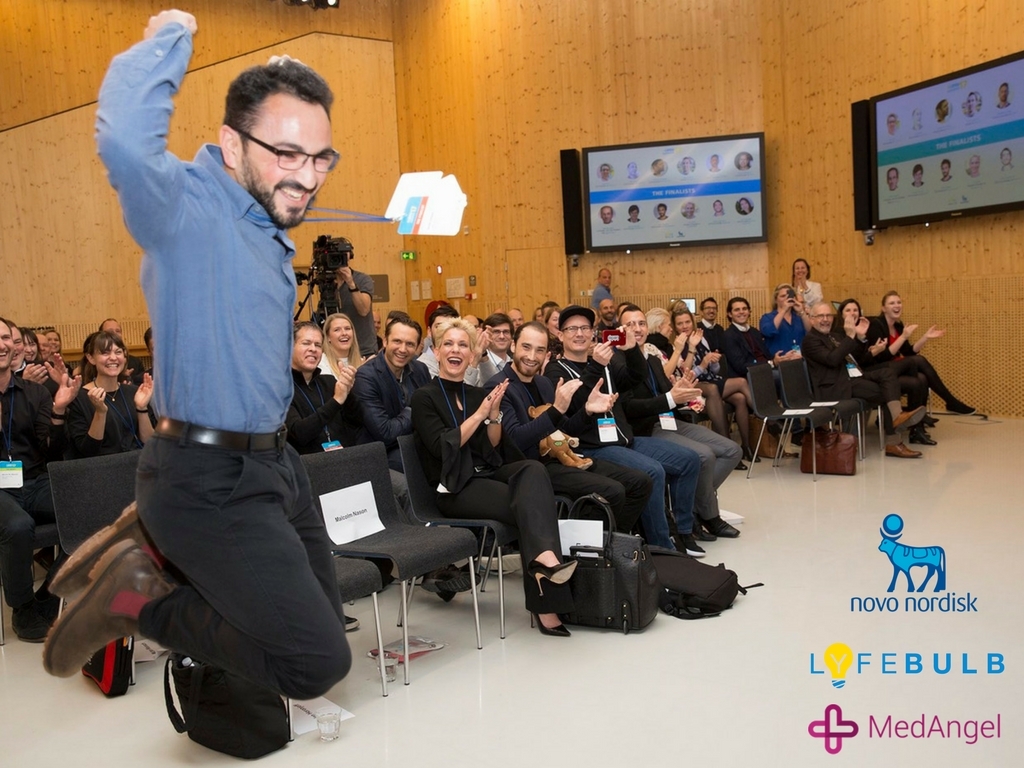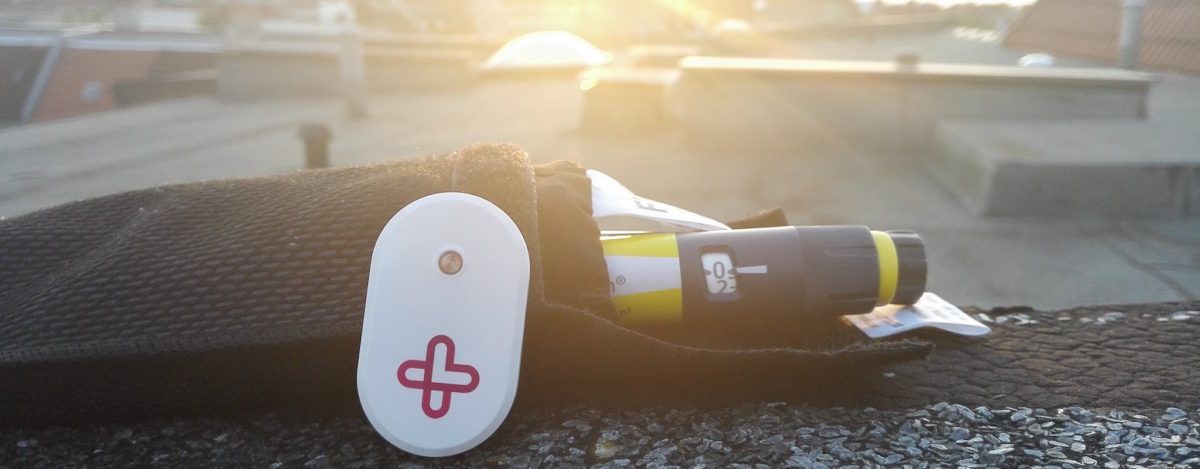Disrupting D-Tech: Amin Zayani
Purchase a MedAngel thermometer here!
What do engineering, hackathons, smart home technology, design and award-winning innovation all have to do with diabetes? Developments in all of these fields are influencing (or will influence) the way we manage diabetes every day.
People with type 1 know we live in a time of burgeoning opportunity for growth and improvement in diabetes—perhaps none better than Amin Zayani, the 2017 winner of the Patient Entrepreneur award presented at the Lyfebulb-Novo Nordisk Innovation Summit. When Amin, who lives in Berlin, was diagnosed with type 1 at 20 years old, his family had already been living with their younger son’s type 1 for 14 years.
“Insulin injections were part of our daily lives,” Amin said.
One incident gave Amin the idea to invent MedAngel, the app for which he received the award.
“I believe that nobody should ever have an insulin pen or a vial in their hand and not know if it will work or not—if it’s still safe to use or not,” he told us.
Beyond Type 1 recently sat down with Amin to discuss what it’s like to be a disrupter in diabetes technology.
The idea
“MedAngel was born from one of very few frustrating moments I had with diabetes,” said Amin, who takes multiple daily injections and doesn’t experience severe hypoglycemia or any complications. “Diabetes was an unwanted, unwelcome member of the family. When I was diagnosed, it wasn’t a big shock to me, and since then I have had a smooth life with diabetes.”
Until …
“One day in August 2013, I woke up, I measured my blood glucose. It was high. I corrected. One hour later, I [checked] again and it was still high. I took a larger shot and it just wouldn’t go down, so I took a fresh pen from the fridge, I took a really big shot, and it still wouldn’t go down. I really started to panic.
“I went to the emergency room; luckily I was not yet in diabetic ketoacidosis (DKA), but I got some [IV fluids] and they sent me home after a couple of hours with a fresh batch of insulin. I was quite anxious and frustrated. I really wanted to know what was the cause of the problem because I wanted to avoid it.”
Amin realized that the problem was right in his home—specifically, his refrigerator.
“It tended to freeze during the night and go back to normal in the morning when people started to open it. So obviously my insulin was totally frozen in that fridge at nights and it gradually lost its effectiveness. And I was injecting it. It was a relief to know that, and I tried to find a solution for this.
“I thought, It can’t be that hard. There has to be a temperature sensor that alarms when this happens so I can prevent it. So I made one. I hacked a couple of electronics I have on my workbench and it worked. I made one for my brother, and my problem was solved. And then I started to present it at several local events in Germany, and the enthusiasm was very high; the feedback was very positive.”
 The problem
The problem
When he researched his idea for MedAngel, Amin found that the issue of temperature regulation is quite universal.
“Domestic refrigerators are simply not made to store medications,” he told us. “Your fridge at home, and mine, are only checked when they are broken. Sometimes they are not closed properly, sometimes things get shuffled around. Pharmaceutical refrigerators are made by design and they are constantly checked on a regular basis by a technician.”
Refrigeration is only one aspect of the issue. “Imagine the number of families that go to the beach with an insulin pump or insulin pens, and they’re constantly keeping an eye on that bag: is it still in the shade? Is it still in the cooler, but not next to the ice packs? That kind of spoils the fun of being at the beach.”
MedAngel gives families who store and carry insulin peace of mind across all of these scenarios, Amin said.
“We are committed to reducing unnecessary waste because of uncertainty. So you have a vial in your hand and you don’t know if it’s still good or not. You’re gonna discard it, you’re gonna buy a new one, just to make sure that you are well and that you are injecting insulin that works, and that can be a big financial burden for any family—especially in the USA, where copays are really high.
“We see MedAngel as a companion in the background, but when you need to have that reassurance, you get the app out and you have that feeling that you’re fine.”
The technology
According to Amin, 25 percent of all patients freeze their medications accidentally without even realizing it. Well-executed, innovative technology can play a huge part in solving these issues, and also create business opportunities.
“It’s a massive problem. I saw a business opportunity. The timing was right, the technology was mature enough. Electronics are quite affordable and accessible. So I quit my job, I invested all my savings, I took a loan from the bank, and I joined a startup, an accelerator in the Netherlands.”
Recognition from “two major players in the diabetes tech scene,” Lyfebulb and Novo Nordisk, has had a huge impact on Amin’s work.
“They organize the Patient Entrepreneur award to recognize important initiatives, projects and companies, so winning means a lot to us,” Amin said. “The competition was so good: very hard-working, top-level startups in the field, so winning with that competition is a lot of validation for us. The visibility and the exposure are also important, especially in raising the awareness of the problem of storage and transport of insulin. Most people are not even aware that their insulin can sometimes not be working properly.”

The future
Amin has his eyes focused not only on the future of diabetes-specific technology, including internet-connected refrigerators, but on everything else that impacts diabetes management.
“I was mentoring a hackathon at Berlin’s largest hospital, and one of the tracks was coming up with solutions for diabetes. There was one participant with type 1 who had severe hypos in his sleep, and what he and his team did was an integration between his Dexcom and Alexa, so before a hypo gets too severe, Alexa wakes him up and tells him to get some carbs. If he doesn’t react, it calls a person of choice or the emergency services. I thought it was a clever hack.
“Ten years ago, you and I didn’t have smart phones, and today our lives revolve around them. I can’t even imagine how it will be in ten years.”
One thing that won’t change for Amin? The role the diabetes community plays in positively affecting diabetes management and innovation.
“If I didn’t get the positive feedback and initial validation from my community, I never would have started MedAngel. The empathy and the understanding of walking in each other’s shoes is extremely important. We can spread ideas in a faster, more human way than the industry. Online communities like Beyond Type 1 will play a major role in raising awareness.”
Read more on how temperature affects insulin.
 Download the Beyond Type 1 App and join our community today!
Download the Beyond Type 1 App and join our community today!



 The problem
The problem


